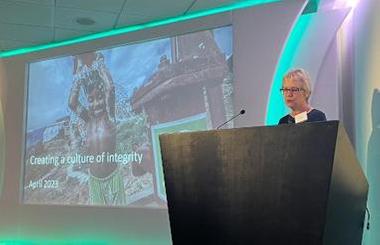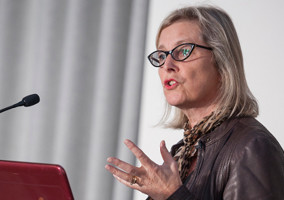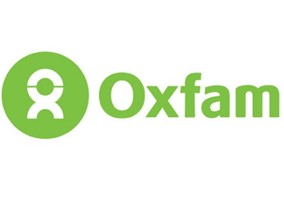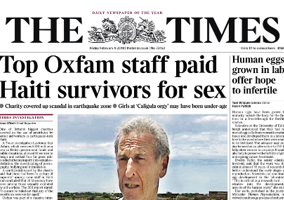Charities should be more focused on the risk they pose to others as opposed to reputational risk, an Oxfam director has said.
Kate Sayer, who became Oxfam’s first director of integrity and ethics three years ago, said a preoccupation with reputational risk can divert attention away from supporting people who may have been harmed by the charity itself.
Speaking at Civil Society Media’s ESG Imperative yesterday, Sayer said Oxfam was now focused on tackling “systems of corruption” instead of just individual misconduct.
She said Oxfam was now having “courageous conversations” with partner organisations to hold them to account.
Integrity more important than ‘protecting the name of Oxfam’
“We have done this massive pivot, which is saying that the risk that we pose to other people is the problem. It’s not the risk to our reputation where we should focus our attention,” she told delegates at.
“It’s a massive turnaround in the whole way of thinking about reputational risk. It’s who is at risk that is the focus for what we need to do in terms of integrity, rather than doing things that are about protecting the name of Oxfam.
“I go berserk if I hear people talking about protecting the good name of Oxfam. How is that helping that person who has been harmed? We’ve got to prevent that harm.”
Taking out a few bad apples doesn’t work
Sayer said the sexual misconduct scandal at Oxfam will follow the charity for a long time.
She said initially Oxfam had focused on individual misconduct but soon found “a real problem with that kind of narrative” as it does not tackle systems of injustice.
“We have to address the systems. If you take out a few bad apples, guess what happens? Another one pops into their place. And that is the system of corruption I’m afraid that we face in some of the places where we work.
“It’s not the fault of the people – I’ve met the most lovely people who really want to make a difference working for Oxfam, for NGOs or for communities – but the systems of corruption are.”
She said that the charity has learnt lessons from the scandal, one of them being “how we do things is as important as what we do”.
Survivor-centred approach
Oxfam now has a survivor-centred approach to ethics and integrity which includes bullying and harassment as well as sexual misconduct, said Sayer.
Sayer said the number of untrue, “malicious” allegations made are only a handful of those they encounter so it was important that the charity believed the reports being made to them
“If somebody comes to me and they say: ‘I’m being bullied,’ I believe that that’s true.”
Asking victims to “jump through hoops” to prove they have been exploited is not right, Sayer said.
“People can take a year to summon up the courage to report bullying or harassment. And sometimes they don’t do it until they’ve left because they don’t feel safe,” she said.
“I’m passionate about this. Hearing people who are telling you how they've been harmed – that's a pretty compelling reason to do things differently.”
She said that this approach recognises that misconduct occurs where there are power imbalances, so there must be more work on prevention, safe programming and safeguarding.
‘We have to live our values’
A charity cannot talk about injustice in the world, which may be one of its key missions and values, if it is harbouring it in its own organisation, Sayer said.
She said Oxfam “could not possibly have done anything like” its recent campaign on famine without addressing concerns within its own organisation.
“The shouting would have been: ‘Look at you, you can’t say anything about any of this. You as an organisation don’t have integrity,’” she said.
Oxfam is now having “courageous conversations” with partner organisations to hold them to account, Sayer said.
“We will never eliminate power abuse. It’s just not possible. We won’t eliminate sexual misconduct, we won’t eliminate corruption, but at least we can commit to saying that you will take action when we do find it – but we go beyond that now.
“That was when I came in and thought we need to prevent it in the first place. It’s not okay to make people suffer and then say: ‘I’m sorry.’ So, we want to stop going around saying sorry, we want to make sure we address it. We have to have congruence between what we say and what we do.”
Oxfam is now publishing an integrity report every six months.
Related articles












